| Listing 1 - 10 of 14 | << page >> |
Sort by
|
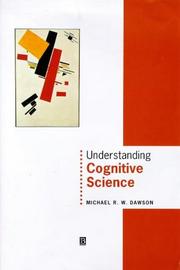
ISBN: 063120895X Year: 1998 Publisher: Malden Oxford Blackwell Publishers
Abstract | Keywords | Export | Availability | Bookmark
 Loading...
Loading...Choose an application
- Reference Manager
- EndNote
- RefWorks (Direct export to RefWorks)
This concise introduction to cognitive science provides the theoretical foundations of classical and connectionist cognitive science to illustrate the underlying unity of the field. It approaches cognitive science through the 'tri-level hypothesis' which assumes that the diverse fields of cognitive science should not be studied together, but also in constant communication with each other, rather than as a collection of otherwise only cognitive friendly disciplines.
Cognition. --- Cognitive science. --- Human information processing. --- Cognitive science

ISBN: 0472105418 Year: 1998 Publisher: Ann Arbor : The University of Michigan Press,
Abstract | Keywords | Export | Availability | Bookmark
 Loading...
Loading...Choose an application
- Reference Manager
- EndNote
- RefWorks (Direct export to RefWorks)
Political psychology --- Public opinion --- Human information processing --- Judgment --- Kiesgedrag.
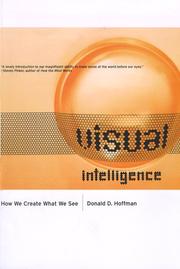
ISBN: 0393319679 0393046699 9780393319675 Year: 1998 Publisher: New York (N.Y.): Norton
Abstract | Keywords | Export | Availability | Bookmark
 Loading...
Loading...Choose an application
- Reference Manager
- EndNote
- RefWorks (Direct export to RefWorks)
159.931 --- 159.931 Zien. --- Zien. --- Affective and dynamic functions --- Physiology of nerves and sense organs --- Visual Perception --- Vision --- Human information processing --- Neuropsychology --- Human information processing. --- Neuropsychology. --- Vision. --- Visual perception. --- Visual perception --- #PBIB:1999.3 --- Optics, Psychological --- Eyesight --- Seeing --- Sight --- Information processing, Human --- Psychological aspects --- Perception --- Visual discrimination --- Senses and sensation --- Blindfolds --- Eye --- Physiological optics --- Neurophysiology --- Psychophysiology --- Bionics --- Information theory in psychology --- Zien
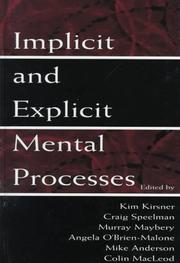

ISBN: 0805813594 Year: 1998 Publisher: Mahwah, NJ ; London : Lawrence Erlbaum Associates [LEA],
Abstract | Keywords | Export | Availability | Bookmark
 Loading...
Loading...Choose an application
- Reference Manager
- EndNote
- RefWorks (Direct export to RefWorks)
Cognition --- Intellect --- Human information processing --- Intelligence --- Information, Traitement de l', chez l'homme --- #PBIB:1999.4 --- Intellect. --- Human intelligence --- Mind --- Ability --- Psychology --- Thought and thinking --- Information processing, Human --- Bionics --- Information theory in psychology --- Perception
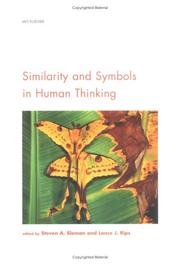
ISBN: 0262692147 0262287900 0585077762 9780585077765 9780262692144 9780262287906 Year: 1998 Publisher: Cambridge, Mass. MIT Press
Abstract | Keywords | Export | Availability | Bookmark
 Loading...
Loading...Choose an application
- Reference Manager
- EndNote
- RefWorks (Direct export to RefWorks)
Cognitive psychology --- Psycholinguistics --- Cognition. --- Human information processing. --- Psycholinguistics. --- Symbolism (Psychology) --- Similarity (Psychology) --- Cognition --- Information, Traitement de l', chez l'homme --- Psycholinguistique --- Symbolisme (Psychologie) --- Similarité (Psychologie) --- Human information processing --- Social Sciences --- Psychology --- Similarity (Psychology). --- Symbolism (Psychology). --- Similarité (Psychologie) --- Symbolism in psychology --- Language, Psychology of --- Language and languages --- Psychology of language --- Speech --- Information processing, Human --- Psychological aspects --- Paired-association learning --- Perception --- Psychoanalysis --- Linguistics --- Thought and thinking --- Bionics --- Information theory in psychology
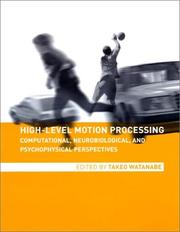
ISBN: 0262231956 0262285843 0585078599 9780262285841 9780585078595 9780262231954 Year: 1998 Publisher: Cambridge, Mass. MIT Press
Abstract | Keywords | Export | Availability | Bookmark
 Loading...
Loading...Choose an application
- Reference Manager
- EndNote
- RefWorks (Direct export to RefWorks)
Motion perception is fundamental to survival. Until recently, research on motion perception emphasized such basic aspects of motion as sampling and filtering. In the past decade, however, the emphasis has gradually shifted to higher-level motion processing--i.e., processing that takes place not only in the primary visual cortex but also in the "higher" or more complicated parts of the brain. The contributors to this book focus on such key aspects of motion processing as interaction and integration between locally measured motion units, structure from motion, heading in an optical flow, and second-order motion. They also discuss the interaction of motion processing with other high-level visual functions such as surface representation and attention. The book is divided into three sections: (1) interactive aspects of motion, (2) motion coherence and grouping, and (3) heading and structure from motion. Each section begins with computational aspects, proceeds to the neuropsychological/neurophysiological, and ends with the psychophysical. Contributors : Thomas D. Albright, Don Beinfang, Patrick Cavanagh, Karen R. Dobkins, Stephen Grossberg, Norberto M. Grzywacz, Ellen C. Hildreth, Marjorie LeMay, Zhong-Lin Lu, Satoru Miyauchi, Ken Nakayama, Constance S. Royden, Takao Sato, George Sperling, Keiji Tanaka, James T. Todd, Peter Tse, William R. Uttal, Lucia M. Vaina, William H. Warren, Jr., Takeo Watanabe, Edward Wolpow, Alan L. Yuile.
Motion perception (Vision) --- Motion Perception --- Visual Perception --- Perception --- Mental Processes --- Psychological Phenomena and Processes --- Psychiatry and Psychology --- Physiological aspects. --- physiology. --- #PBIB:1999.4 --- Psychologic Processes and Principles --- Human Information Processing --- Information Processing, Human --- Perceptions --- Perception, Visual --- Perceptions, Visual --- Visual Perceptions --- Perception, Motion --- Movement perception (Vision) --- Speed perception --- Psychologic Processes --- Psychological Processes --- Phenomena, Psychological --- Processes, Psychologic --- Processes, Psychological --- Psychological Phenomenas --- Psychological Processe --- Sensation --- Vision, Ocular --- Movement, Psychology of --- Vision --- Visual perception --- Physiological aspects
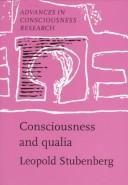
ISBN: 1283174405 9786613174406 9027283494 9789027283498 1556191855 9781556191855 9027251258 9789027251251 Year: 1998 Publisher: Amsterdam Philadelphia J. Benjamins Pub.
Abstract | Keywords | Export | Availability | Bookmark
 Loading...
Loading...Choose an application
- Reference Manager
- EndNote
- RefWorks (Direct export to RefWorks)
This is a philosophical study of qualitative consciousness, characteristic examples of which are pains, experienced colors, sounds, etc. Consciousness is analyzed as the having of qualia. Phenomenal properties or qualia are problematical because they lack appropriate bearers. The relation of having is problematical because none of the typical candidates for this relation - introspection, inner monitoring, higher level thoughts - is capable of explaining what it looks like to have a quale . The qualia problem is solved by introducing a bundle theory of phenome
Consciousness. --- Philosophy of mind. --- Qualia. --- Qualia --- Consciousness --- Cognition --- Psychophysiology --- Humanities --- Psychological Phenomena and Processes --- Mental Processes --- Psychiatry and Psychology --- Philosophy --- Pharmacy Philosophy --- Philosophical Overview --- Hedonism --- Stoicism --- Overview, Philosophical --- Overviews, Philosophical --- Pharmacy Philosophies --- Philosophical Overviews --- Philosophies --- Philosophies, Pharmacy --- Philosophy, Pharmacy --- Consciousnesses --- Human Information Processing --- Information Processing, Human --- Psychologic Processes --- Psychologic Processes and Principles --- Psychological Processes --- Phenomena, Psychological --- Processes, Psychologic --- Processes, Psychological --- Psychological Phenomenas --- Psychological Processe --- Mind-Body Relationship (Physiology) --- Physiologic Psychology --- Physiological Psychology --- Psychology, Physiologic --- Mind-Body Relations (Physiology) --- Psychology, Physiological --- Mind Body Relations (Physiology) --- Mind Body Relationship (Physiology) --- Mind-Body Relation (Physiology) --- Mind-Body Relationships (Physiology) --- Physiologic Psychologies --- Psychologies, Physiologic --- Relation, Mind-Body (Physiology) --- Relations, Mind-Body (Physiology) --- Relationship, Mind-Body (Physiology) --- Relationships, Mind-Body (Physiology) --- Psychosomatic Medicine --- Mind-Body Relations, Metaphysical --- Cognitive Function --- Cognitions --- Cognitive Functions --- Function, Cognitive --- Functions, Cognitive --- Apperception --- Mind and body --- Perception --- Psychology --- Spirit --- Self --- Knowledge, Theory of --- Philosophy of mind --- Philosophical anthropology --- Theory of knowledge
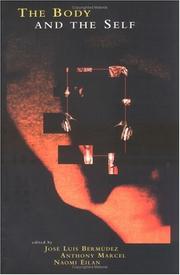
ISBN: 0262522489 0262023865 0262268264 058502183X 9780585021836 9780262023863 9780262268264 9780262522489 Year: 1998 Publisher: Cambridge (Mass.) : MIT press,
Abstract | Keywords | Export | Availability | Bookmark
 Loading...
Loading...Choose an application
- Reference Manager
- EndNote
- RefWorks (Direct export to RefWorks)
The Body and the Self brings together recent work by philosophers and psychologists on the nature of self-consciousness, the nature of bodily awareness, and the relation between the two. The central problem addressed is How is our grasp of ourselves as one object among others underpinned by the ways in which we use and represent our bodies? The contributors take up such issues as how should we characterize the various distinctive ways we have of being in touch with our own bodies in sensation, proprioception, and action? How exactly does our grip on our bodies as objects connect with our ability to perceive the external environment, and with our ability to engage in various forms of social interaction? Can any of these ways of representing our bodies affect a bridge between body and self?
Body schema --- Body Image --- Body percept --- Percept, Body --- Body image --- Self-perception --- Perception --- Personality Development --- Personality --- Mental Processes --- Psychological Phenomena and Processes --- Behavior and Behavior Mechanisms --- Psychiatry and Psychology --- Self Concept --- Social Sciences --- Psychology --- Perceptions --- Sensation --- Self-concept --- Self image --- Self-understanding --- Self-discrepancy theory --- Self-evaluation --- Schema, Body --- Schemas (Psychology) --- Somesthesia --- Image, Body --- Imagery (Psychology) --- Mind and body --- Person schemas --- Human body --- Self-Perception --- Self Esteem --- Self Perception --- Concept, Self --- Concepts, Self --- Esteem, Self --- Esteems, Self --- Perception, Self --- Perceptions, Self --- Self Concepts --- Self Esteems --- Self Perceptions --- Self-Perceptions --- Personal Autonomy --- Body Representation --- Body Schema --- Body Images --- Body Representations --- Body Schemas --- Images, Body --- Representation, Body --- Representations, Body --- Schemas, Body --- Physical Appearance, Body --- Psychologic Processes --- Psychologic Processes and Principles --- Psychological Processes --- Phenomena, Psychological --- Processes, Psychologic --- Processes, Psychological --- Psychological Phenomenas --- Psychological Processe --- Human Information Processing --- Information Processing, Human --- Personalities --- Human Characteristics --- Development, Personality --- Child Development --- Growth --- Self Confidence --- Confidence, Self --- ro: ed. by --- Body image. --- Body schema. --- Self-perception. --- Humans --- Body --- Philosophy. --- COGNITIVE SCIENCES/General --- PHILOSOPHY/General --- Philosophical anthropology
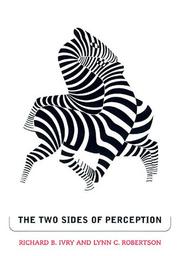
ISBN: 0262090341 0262276062 0585022771 9780262276061 9780585022772 9780262090346 Year: 1998 Publisher: Cambridge, Mass. MIT Press
Abstract | Keywords | Export | Availability | Bookmark
 Loading...
Loading...Choose an application
- Reference Manager
- EndNote
- RefWorks (Direct export to RefWorks)
Brain --- Cerebral dominance. --- Dominance, Cerebral --- Laterality. --- Perception --- Perception. --- physiology. --- Dominance cérébrale --- Latéralité --- Dominance cérébrale --- Latéralité --- Cerebrospinal Axis --- Axi, Cerebrospinal --- Axis, Cerebrospinal --- Central Nervous Systems --- Cerebrospinal Axi --- Nervous System, Central --- Nervous Systems, Central --- System, Central Nervous --- Systems, Central Nervous --- Nervous Systems --- System, Nervous --- Systems, Nervous --- Cerebral dominance --- Laterality --- Physiology --- Nervous System Physiological Phenomena --- Psychophysiology --- Central Nervous System --- Mental Processes --- Biological Science Disciplines --- Musculoskeletal and Neural Physiological Phenomena --- Psychological Phenomena and Processes --- Nervous System --- Natural Science Disciplines --- Disciplines and Occupations --- Phenomena and Processes --- Psychiatry and Psychology --- Anatomy --- Neuroscience --- Human Anatomy & Physiology --- Health & Biological Sciences --- Psychologic Processes and Principles --- Musculoskeletal and Neural Physiological Concepts --- Musculoskeletal and Neural Physiological Phenomenon --- Musculoskeletal and Neural Physiology --- Biologic Sciences --- Biological Science --- Science, Biological --- Sciences, Biological --- Biological Sciences --- Life Sciences --- Biologic Science --- Biological Science Discipline --- Discipline, Biological Science --- Disciplines, Biological Science --- Life Science --- Science Discipline, Biological --- Science Disciplines, Biological --- Science, Biologic --- Science, Life --- Sciences, Biologic --- Sciences, Life --- Human Information Processing --- Information Processing, Human --- Mind-Body Relationship (Physiology) --- Physiologic Psychology --- Physiological Psychology --- Psychology, Physiologic --- Mind-Body Relations (Physiology) --- Psychology, Physiological --- Mind Body Relations (Physiology) --- Mind Body Relationship (Physiology) --- Mind-Body Relation (Physiology) --- Mind-Body Relationships (Physiology) --- Physiologic Psychologies --- Psychologies, Physiologic --- Relation, Mind-Body (Physiology) --- Relations, Mind-Body (Physiology) --- Relationship, Mind-Body (Physiology) --- Relationships, Mind-Body (Physiology) --- Nervous System Physiological Concepts --- Nervous System Physiological Phenomenon --- Nervous System Physiological Process --- Physiology, Nervous System --- Nervous System Physiologic Processes --- Nervous System Physiological Processes --- Nervous System Physiology --- System Physiology, Nervous --- Hemispheric Specialization --- Cerebral Dominance --- Dominances, Cerebral --- Specialization, Hemispheric --- Natural Sciences --- Physical Sciences --- Discipline, Natural Science --- Disciplines, Natural Science --- Natural Science --- Natural Science Discipline --- Physical Science --- Science, Natural --- Science, Physical --- Sciences, Natural --- Sciences, Physical --- Encephalon --- Brains --- Encephalons --- Perceptions --- Supraliminal perception --- Functional asymmetry (Brain) --- Hemispheric dominance (Brain) --- Lateralization (Brain) --- Left and right brain --- Right and left brain --- physiology --- Anatomies --- Psychologic Processes --- Psychological Processes --- Phenomena, Psychological --- Processes, Psychologic --- Processes, Psychological --- Psychological Phenomenas --- Psychological Processe --- Psychosomatic Medicine --- Mind-Body Relations, Metaphysical --- Sensation --- Cognition --- Apperception --- Senses and sensation --- Thought and thinking --- Dual-brain psychology --- Cerebral hemispheres --- Whole brain learning
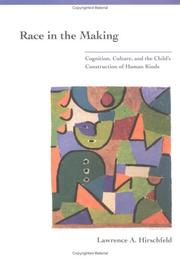
ISBN: 0262082470 0262581728 0262275414 0585003092 9780262275415 9780585003092 9780262082471 9780262581721 Year: 1998 Publisher: Cambridge, Mass. London, England MIT Press
Abstract | Keywords | Export | Availability | Bookmark
 Loading...
Loading...Choose an application
- Reference Manager
- EndNote
- RefWorks (Direct export to RefWorks)
Race in the Making provides a new understanding of how people conceptualize social categories and shows why this knowledge is so readily recruited to create and maintain systems of unequal power. Hirschfeld argues that knowledge of race is not derived from observations of physical difference nor does it develop in the same way as knowledge of other social categories. Instead, his central claim is that racial thinking is the product of a special-purpose cognitive competence for understanding and representing human kinds. The book also challenges the conventional wisdom that race is purely a social construction by demonstrating that a common set of abstract principles underlies all systems of racial thinking, whatever other historical and cultural specificities may be associated with them. Starting from the commonplace observation that race is a category of both power and the mind, Race in the Making directly tackles this issue. Through a sustained exploration of continuity and change in the child's notion of race and across historical variations in the race concept, Hirschfeld shows that a singular commonsense theory about human kinds constrains the way racial thinking changes, whether in historical time or during childhood. After surveying the literature on the development of a cultural psychology of race, Hirschfeld presents original studies that examine children's (and occasionally adults') representations of race. He sketches how a jointly cultural and psychological approach to race might proceed, showing how this approach yields new insights into the emergence and elaboration of racial thinking
Cognition and culture. --- Racism. --- Ethnopsychology. --- Cognition in children. --- Child psychology. --- Prejudices in children. --- Cognition et culture --- Racisme --- Ethnopsychologie --- Cognition chez l'enfant --- Enfants --- Préjugés chez l'enfant --- Psychologie --- Cognition and culture --- Racism --- Ethnopsychology --- Cognition in children --- Child psychology --- Prejudices in children --- Culture --- Psychology, Social --- Age Groups --- Population Groups --- Thinking --- Mental Processes --- Persons --- Anthropology, Cultural --- Psychological Phenomena and Processes --- Behavior and Behavior Mechanisms --- Sociology --- Named Groups --- Social Sciences --- Anthropology --- Psychiatry and Psychology --- Anthropology, Education, Sociology and Social Phenomena --- Cross-Cultural Comparison --- Infant --- Prejudice --- Cognition --- Continental Population Groups --- Concept Formation --- Child --- Psychology --- Bias, Racial --- Race bias --- Race prejudice --- Racial bias --- Prejudices --- Anti-racism --- Race relations --- Prejudices and antipathies (Child psychology) --- Cross-cultural psychology --- Ethnic groups --- Ethnic psychology --- Folk-psychology --- Indigenous peoples --- National psychology --- Psychological anthropology --- Psychology, Cross-cultural --- Psychology, Ethnic --- Psychology, National --- Psychology, Racial --- Race psychology --- National characteristics --- Cognition (Child psychology) --- Thought and thinking in children --- Culture and cognition --- Ethnophilosophy --- Socialization --- Behavior, Child --- Child behavior --- Child study --- Children --- Pediatric psychology --- Psychology, Child --- Child development --- Developmental psychology --- Child psychiatry --- Child rearing --- Educational psychology --- Préjugés chez l'enfant --- Concept Formations --- Formation, Concept --- Formations, Concept --- Race --- Racial Stocks --- Continental Population Group --- Group, Continental Population --- Groups, Continental Population --- Population Group, Continental --- Population Groups, Continental --- Races --- Racial Stock --- Stock, Racial --- Stocks, Racial --- Cognitive Function --- Cognitions --- Cognitive Functions --- Function, Cognitive --- Functions, Cognitive --- Infants --- Transcultural Studies --- Comparison, Cross-Cultural --- Comparisons, Cross-Cultural --- Cross Cultural Comparison --- Cross-Cultural Comparisons --- Studies, Transcultural --- Study, Transcultural --- Transcultural Study --- Science, Social --- Sciences, Social --- Social Science --- General Social Development and Population --- Psychologic Processes and Principles --- Cultural Anthropology --- Ethnography --- Ethnographies --- Person --- Human Information Processing --- Information Processing, Human --- Critical Thinking --- Thinking Skills --- Thinking Skill --- Thinking, Critical --- Indigenous Population --- Native-Born --- Natives --- Tribes --- Group, Population --- Groups, Population --- Indigenous Populations --- Native Born --- Population Group --- Population, Indigenous --- Populations, Indigenous --- Age Group --- Group, Age --- Groups, Age --- Social Psychology --- Psychologies, Social --- Social Psychologies --- Beliefs --- Cultural Background --- Customs --- Background, Cultural --- Backgrounds, Cultural --- Belief --- Cultural Backgrounds --- Cultures --- Custom --- Cultural Characteristics --- Minors --- Psychologic Processes --- Psychological Processes --- Phenomena, Psychological --- Processes, Psychologic --- Processes, Psychological --- Psychological Phenomenas --- Psychological Processe --- Qualitative Research --- Thought --- Thoughts --- Race Factors --- Psychology, Perceptual --- Perceptual Psychology --- Anti-Semitism --- Islamophobia --- Anti Semitism --- Anti-Semitisms --- Islamophobias --- Material Culture --- Culture, Material --- Material Cultures --- Cultural Relativism --- Cultural Relativisms --- Relativism, Cultural --- Relativisms, Cultural --- Critical race theory --- Child Psychology
| Listing 1 - 10 of 14 | << page >> |
Sort by
|

 Search
Search Feedback
Feedback About UniCat
About UniCat  Help
Help News
News